Claudia Romero-Dneprovski is a photographer and mom of an 11-year-old daughter, Anna. When Anna was only a toddler she
had cancer, but survived. Among other things, it was her interest in languages that brought her back to life. Now, she is a real language phenomenon. She speaks 5 languages, Spanish, Russian, German, English and French. Additionally, she is learning two more languages out of interest. During the interview with Claudia, Anna came in and I heard her speaking Spanish with her mom and switching to German effortlessly when she met me via Skype. Anna’s story is truly amazing and inspiring as it shows how much of an impact language can have on someone’s life!
Mom: Spanish, French, English, Italian
Dad: Russian, German, English, French
Daughter: German, English, French, Russian, Spanish, Portuguese & Italian
Veronika:
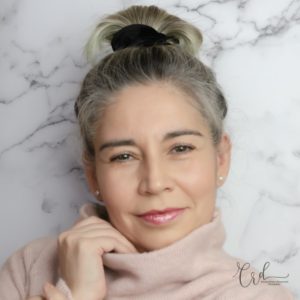
Many thanks, Claudia, for sharing your bilingual journey today. My first question for you is: who belongs to your family and what languages do you speak with each other?
Claudia:
We are a family of three. I’m the mom; I was born in Mexico City. My husband, the dad, was born in Ufa, Russia. Ufa is the capital and largest city of the Republic of Bashkortostan in Russia. We met here in Montreal, Canada which is in Quebec, a French-English province. And then there is our daughter, Anna. She was born in 2009.
So in terms of language… when Anna was born, we decided that we each wanted to speak our native language. I think it’s a choice, not a given. We wanted to pass our languages on to Anna because through a language you convey culture and traditions; it’s our identity. It was our way to make her open toward other cultures and other parts of the world. So, English, French, Spanish, and Russian are our four main languages that we juggled when we started our family. It was partly due to our heritage and partly due to where we are living.
Veronika:
How did you manage four languages?
Starting out with a plan
Claudia:
Well, when we got married, my husband and I spoke mainly English. But because of our jobs, we would sometimes switch to French. It varied. Then when Anna was born, the minute I held her in my arms Spanish just came out. It was my heart speaking. And then I heard my husband speaking Russian to her. It was just natural and I asked myself: How do you talk to a baby? Well, it’s your inner being that just speaks. But we never said to each other, “Oh, no, don’t speak Russian or Spanish because I won’t understand you.” We felt that as a parent you have the right to share anything from you and we were learning from each other. We just listened to the other. I would listen to his Russian and he would listen to my Spanish—even though we didn’t understand very well at the beginning. Over the years, we’ve tried to learn each other’s languages but we never really managed to sit down, take classes or study the other’s language. But then, you know, your ears tune in, so you start making sense of what the other person says. And then, knowing other languages like French and English helps so your ear becomes a bit more receptive to certain things. ‘Oh, that’s the way you pronounce that in Russian? It’s similar to this word in Spanish.’ So you start seeing a lot of things the languages have in common.
Okay, because we are both immigrants, even though we have Canadian citizenship, our daughter was going to go to a French-speaking elementary school. Then, when we said we would switch her to an English-speaking high school. In addition, since learning Russian is much harder than learning Spanish, my husband had already searched for Saturday Russian schools here in Montreal. That was our plan.
When plans have to change…
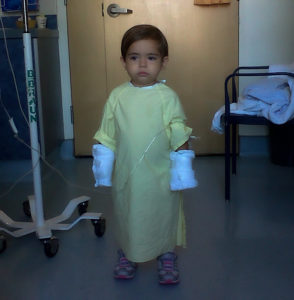 But then, when she had just turned two years old and was going to a Russian-French daycare, she got very, very sick. At first we thought it was a very bad cold or an ear infection or maybe pneumonia. Well, it ended up being cancer, she was diagnosed with acute lymphoblastic leukemia. For sure… that was not in our plans! At that point, education took a backseat. It was about survival, survival, survival. The treatment lasted for four years. During those years, because the immune system is compromised, many moments can “turn sour”. Some children even die, not because of the cancer but because anything and everything can make them sick; sometimes it’s a matter of hours to save them. It was an intense roller coaster ride. One of the things that happened during those years was that Anna had a brain linen inflammation as a side effect of an intraspinal injection. So, for 11 days she was lethargic and barely eating. I remember that I just prayed. I said …
But then, when she had just turned two years old and was going to a Russian-French daycare, she got very, very sick. At first we thought it was a very bad cold or an ear infection or maybe pneumonia. Well, it ended up being cancer, she was diagnosed with acute lymphoblastic leukemia. For sure… that was not in our plans! At that point, education took a backseat. It was about survival, survival, survival. The treatment lasted for four years. During those years, because the immune system is compromised, many moments can “turn sour”. Some children even die, not because of the cancer but because anything and everything can make them sick; sometimes it’s a matter of hours to save them. It was an intense roller coaster ride. One of the things that happened during those years was that Anna had a brain linen inflammation as a side effect of an intraspinal injection. So, for 11 days she was lethargic and barely eating. I remember that I just prayed. I said …
“Please God get her back to life! And make her talk again even if she only speaks one language.”
When she came out of it my husband and I said that we didn’t care about speaking several languages. We decided to go with the flow. So, then Anna started rehabilitation, therapy to walk, coordinate, everything. At that point she was four years old. She had an extensive physiological exam to know what had happened to her brain.
Veronika:
So, you just talked to her in one language then?
Claudia:
Yes, we decided to use English because it was easier for all, Anna included.
Veronika:
So how did that work out for you?
I would like to learn another language
Claudia:
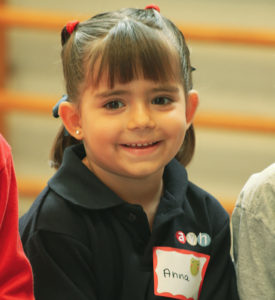
I was very nervous. The psychologist told us that Anna needed a lot of attention. She recommended that we support anything Anna wanted to learn. “Just say yes”, the psychologist told us back then. If Anna wants to dance, let her dance. If she wants to play, let her play. She needs to live. So we did that, but soon she was turning six and the question of school came up. We started to look into private schools nearby because we have heard how smaller classes benefit students. We came across a German school, the Alexander von Humboldt German International School. It’s a very well-known school in Mexico and we thought that they probably offer more of an English education too. One day we went to look at the school and during the tour everybody was speaking German of course. When Anna heard it, she turned around to us and said “I want to be in this school.” We were like “excuse me”? Did you listen that they are speaking another language? And Anna said, ‘Well, you mama speak Spanish, daddy speaks Russian, I speak English and a bit of French because I was born here in Montreal. But you never asked me what language I want to use or learn. I would like to learn another language.’ I remember that my husband and I just looked at each other in disbelief, and we remembered what the psychologist had said. We weren’t sure if another language would actually be a good idea, but we decided to run with it.
… and that was the beginning of Anna’s language journey…
Now, she’s in sixth grade and German has become her number one language. Of course, my husband had to refresh his German that he learned in his late teenage years in Berlin. And I was like, ‘okay, this is really Chinese to me.’ I wasn’t sure when or why I had subscribed to this. If it weren’t for what we had gone through, I would have never made that choice; don’t ask me why we said ‘yes’… I don’t know! Is it hard? Yes. But I always think that maybe she was born with the gift of languages. I don’t know. There have been several times when I wanted to give up in the past years. It just felt like it was too much, too many languages. My husband has been the one that pushes us through and we are grateful for his strength and resilience.
Veronika:
That’s very interesting. So, your daughter goes to school in a language that is neither the home language nor the country’s language. How do you support her, for example, if she has homework questions?
Claudia:
Well, the school helps a lot obviously. For example, they have homework support groups and classes for children whose parents don’t speak German at home. And then my husband brushed up on his German again. So, we kind of split the languages: my husband took Russian and German and I decided to take English, Spanish, and French.
Veronika:
Oh, so you actually went back to speaking Spanish again then after her illness?
Traveling to Mexico and Germany
Claudia:
Oh, yes! When Anna started school at AvH, she was able to speak and understand English, French, Spanish, and Russian. Not 100% and with some difficulties and mixing the languages a lot, but we didn’t care. And we started to take trips and travel a bit. The first place we travelled to was Mexico. Anna was still in her treatment. On that trip, I remember Anna saying “Mommy, they speak like you!” That was an eye opener for her that Spanish is a real language, ha-ha.
And then, we went to Germany thanks to a wish trip Anna was granted by The Children’s Wish Foundation (La Fondation Rêves d’enfants | Division Québec Ouest). At first, when Anna was asked about having a wish come true, she said, “I want chocolate.” But when told that it could be a little more than chocolate, she said “Well, how about going to Germany now that I speak German.” And when she told the foundation, they said, it was the first time ever that a kid was granted a wish to go to a German-speaking country. We went to Berlin when she was almost seven. The minute we arrived in Berlin Anna said, “Oh, it’s just like being at school.”
Last year (2020) we had plans to go to Russia and Austria but, of course, because of COVID, it got canceled. Now Anna feels more confident when it comes to Russian and, I’m sure it will be fun when we can finally travel again and she will do great in a Russian-speaking country.
In any way, I wanted to share a message of hope to parents that even in an almost dire situation when things are out of your control, you can still choose. And if you’re going to choose something for your child, choose education and listen to your child!
Veronika:
Yes, Anna’s story is truly amazing.
“The importance of language for me is that you get to know people in a deeper way”
Claudia:
 It is not about bragging. It’s not about “look at us” although many people are very quick to judge or draw conclusions. I think my motivation was the impact a language can have in someone’s life. And the importance of language for me is that you get to know people in a deeper way and you discover so many things you never imagined.
It is not about bragging. It’s not about “look at us” although many people are very quick to judge or draw conclusions. I think my motivation was the impact a language can have in someone’s life. And the importance of language for me is that you get to know people in a deeper way and you discover so many things you never imagined.
Veronika:
You are able to build bridges a lot quicker with people and understand where they are coming from. So, you have a deeper understanding and appreciation of differences in terms of how people think.
Claudia:
Absolutely!
Veronika:
So let me ask you: How do you juggle all those languages at home now? Practically, during the day, how do you put all five languages to work at home?
Juggling 5 languages at home
Claudia:
At the German school, they also have English and French classes because we are in the province of Quebec. The school’s challenging program adheres to both German and Quebec curricular requirements. At Russian school, every class and activity is in Russian but they also have a very strong French influence. At home, we mix languages. It takes a lot of patience as parents if you really want to make it happen.
Veronika:
You mentioned that in the beginning, as a younger child, Anna mixed languages a lot. How about now?
Claudia:
In the beginning? Yes, of course. But now, she’s very capable of separating languages. We do our best to address Anna in our native languages; however, many times she chooses to come back in a different language. I once read about “one parent, one language” or OPOL, but we have not succeeded at that.
Veronika:
No, in your situation, OPOL doesn’t really make sense. How do you give language feedback to Anna?
How to correct language errors and be a good role model
Claudia:
The way we correct her is more indirect. For example, if she says a verb in Spanish in a very French way, I don’t go, “Oh, my god, no, that’s wrong.” I simply say, “oh, you meant xyz”. I repeat it and say it right. Same for my husband. It’s hilarious to watch when a kid is learning several languages at a time and somehow chooses to use some words from one language’s “dictionary” and then applies them to another language. Nowadays, Anna corrects us the way we pronounce something in German, French, or English.
Veronika:
Haha! I can see that… so when you correct her language, you repeat something in the correct way within the flow of the conversation?
Claudia:
Yes, so she hears the correct way.
Veronika:
That’s right. What kind of advice would you give to other parents who are either considering to raise their children with multilingual languages or who are already on their bilingual journey?
For bilingual parents: Make the time, make the effort, and don’t give up.
Claudia:
If they are already on the bilingual journey, just be patient and stick to it. Make the time, make the effort, and don’t give up. The results are in the long run. However, as a family you need to be able to have fun while learning. It takes a lot of perseverance, a lot of dedication from the parents. And utilize the many resources out there: online classes, apps, switch the audio and subtitles when watching movies, etc. Anna enjoys the website logo.de in German.
Veronika:
Oh, Logo. The news for children?
Claudia:
Yes, it was recommended by one of her teachers and now I love to watch it too!
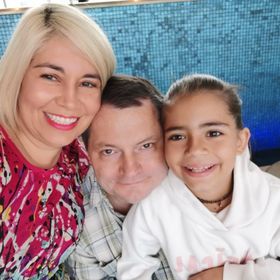 Anyways…for us, our multilingual journey has taught us to focus on family and learn from each other. I think it’s not only the learning of languages that makes a multilingual journey special. It’s a whole learning process, not only for the kids, but for us as parents too. It has definitely enriched our lives. The deeper Anna is diving into a language, the more we as a family learn about many topics, songs, movies, recipes, etc. For us as parents now traveling has another “flavor” (we like to cook and try new recipes from many countries!). And, for Anna, we tell her that the world awaits her! She’ll be able to study wherever she wants … at a German, French, English or Russian speaking university. And if she continues to learn other languages, wow, what can we say? We’re blessed, grateful and happy.
Anyways…for us, our multilingual journey has taught us to focus on family and learn from each other. I think it’s not only the learning of languages that makes a multilingual journey special. It’s a whole learning process, not only for the kids, but for us as parents too. It has definitely enriched our lives. The deeper Anna is diving into a language, the more we as a family learn about many topics, songs, movies, recipes, etc. For us as parents now traveling has another “flavor” (we like to cook and try new recipes from many countries!). And, for Anna, we tell her that the world awaits her! She’ll be able to study wherever she wants … at a German, French, English or Russian speaking university. And if she continues to learn other languages, wow, what can we say? We’re blessed, grateful and happy.
Veronika:
Many thanks, Claudia! That was a really inspiring interview and a very interesting final thought: the bilingual journey is a learning experience for you as parents and as a family. It’s not just a journey for the child; it’s something for you to reflect and grow as a whole.
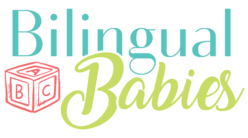
4 comments
What a beautiful and inspiring story! I admired the work of these parents and their beautiful, smart, courageous and talented little girl! God bless the three of you in your journey!
Maravillosa historia.
Claudia, I love reading your story and wish Anna and your husband a great life by your side. xo
Wonderful Story!
I also live in Montreal. I speak 3 official languages (English, French, Mandarin) and 1 dialect. I am raising my kids to be trilingual. My kids also learn a bit of Spanish in his daycare. My elder has already told me multiple times that he wishes to keep learning Spanish.